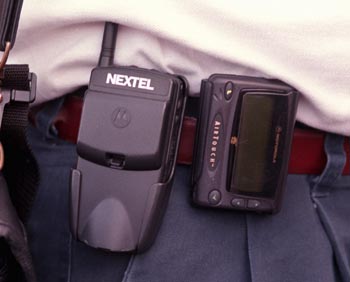![[Metroactive Features]](/features/gifs/feat468.gif)
[ Features Index | San Jose | Metroactive Central | Archives ]
Loud as They Wanna Be
If cell phone users are too loud, it's because you are just too old: What happens when technology moves faster than etiquette
By Kelly Luker
Photographs by George Sakkestad
THEY JUST WON'T shut up.
Yapping and hollering at the top of their lungs, they seem to think they're the only ones in this world. They act as if all the space here--even in obviously public places--belongs to them exclusively.
I'm not talking about cell phone users, mind you, but everyone else--loudly and forcefully voicing their opinions about the lowly mobile telephone. Perhaps not about the cell phone itself, but about the morons and half-baked nitwits who brazenly use it while driving, sitting in restaurants, walking down the street and standing in line at the grocery store.
Um, that would be me, I guess. On all four counts.
On the other hand, I can just as quickly switch to being the aggrieved bystander, seething inwardly as someone broadcasts their personal business into their Nokia while Aerobicycling at the gym.
Having a cell phone--and abusing it--does not offer immunity to that bolt of annoyance that shoots through us when we catch a glimpse of someone nearby chatting away into their handheld.
We have our reasons, excellent reasons. They're talking much too loudly, making us want to tap them on the shoulder and remind them it's digital technology, not two tin cans connected by a string. If they're driving, any minute now they're going to start weaving, very likely involving us in a horrific head-on that results in a coma or quadriplegia.
Most of the time, however, we're not sure why we hate cell phones and the people who love them. All we know is, we do.
Given that about one-third of a million new subscribers around the world are picking up a cellular every day, maybe it's time to heal this digital divisiveness. In the famous words of Rodney King, more or less, why can't we all just get along?
Motormouths: Is driving and yakking really all that dangerous? Well, yeah.
Cancer Cell: Do cell phones equal damaged brain cells?
Microwaves on the Brain: The research is in: cell phones really do separate the quick from the dead.
Newbies
REASON NUMBER ONE: It's a newfangled contraption. Although the cell phone's popularity is spreading quickly, that's part of the problem. We're still working out etiquette issues, according to UC-Berkeley sociologist Claude Fischer. The present back-lash, insists Fischer, is no different than our response to the cell phone's ancient forebear.
"The etiquette of the phone was an issue," reminds Fischer, author of America Calling: A Social History of the Telephone to 1940. Invented in 1876, the telephone was seen as a "wonder of science," recalls Fischer, but it wasn't clear what it would be good for. "The telephone was originally marketed as a business instrument," he says. "But by the end of the 19th century, people increasingly were using it as a social device for friendly conversation."
The Bell company and AT&T, who had subsequent monopolies on the telephone, originally tried to discourage the phone's use for "idle chitchat." Upon recognizing that the golden egg lay beneath the human need to socialize, AT&T subsequently reversed its marketing ploy.
However, the telephone had plenty of critics.
Fischer's book opens with a list of topics discussed by a 1926 Knights of Columbus adult education committee under the heading, "Do modern inventions help or mar character and health?" One topic listed is, "Does the telephone break up home life and the old practice of visiting friends?"
While it sounds more reminiscent of our present technophobia about the Internet, the question seems to reflect a deeper fear of how a new invention will erode society's values. Like the cell phone, the introduction of the telephone sent folks into a flurry of reinventing manners.
"[By the] late 19th and 20th century, literature grows around etiquette issues--who should answer, who should say goodbye first," notes Fischer. Books warned against the faux pas of issuing invitations by phone.
Also familiar with the telephone's history is Dr. Robert Pike, a sociologist at Queen's University in Ontario, Canada.
"When the phone was coming in, around the 1880s, there [were] all kinds of worries about its social impact on society," says Pike. "It was considered an intrusion in [people's] lives." The phone was also considered a threat to young people's morals. Pike tells of letters from horrified adults who discovered teens talking on the phone while in their bedclothes.
"They couldn't imagine communications not being visual," Pike explains.
One hundred years later, we take telecommunications for granted. Sort of. As Pike pointed out, people need their visual cues. We have grown accustomed to a telephone being over there, not what appears to be a one-sided conversation over here.
"People are starting to use it like a private phone in a public place," observes Pike of the cell phone's metastasis across the country. "We divide between the front room and back room of our lives. The front stage is when we're in public gaze, and the back stage is what goes on behind the scenes. People do not think it is decent to have the back stage brought to the front stage. There are certain places where, at certain times, you carry out certain types of activities.
"[Using cell phones in public] seems to be an intrusion on a sphere," Pike surmises in his British clip. "I think we see it as a bit aggressive, isn't it?"
Or perhaps, not aggressive enough. When a friend was asked her opinion of what was so annoying about cell phone users, she thought a minute.
"They're paying attention to someone else when they should be paying attention to me," she shrugs.
Fin de Cycle
THIS attention-starved quest to be the center of the universe appears to be a uniquely American personality trait.
"I found in Israel," says Pike, "no one cares when a cell phone goes off." Part of that has to do with the fact that when it comes to the information economy in the global village, the U.S. is still rafting the backwater bayous.
"In Finland and Israel," Pike adds, "they've made a strong effort to make a more communicative society."
The most recent reports peg cell phone ownership among 78 percent of Finland's population, compared to 31 percent here. One out of four homes there have ditched land lines. The Nords owe wireless growth to a couple of ingenious solutions: cheap airtime and reliable airtime.
With that many phones out of the house and into the streets, one would assume Finnish editorials would be chock-full of finger-wagging and tsk-tsking. Not a chance, says technology counselor Kimmo Ahola.
"In Finland, the people know when it is appropriate to talk," sniffs Ahola, who works for Tekes, a company promoting technological cooperation between the U.S. and Finland. "They know not to talk loud. At first, it was status to own a phone, and someone might talk loud to show what they had. But people so rapidly got into them, they started to learn how to behave."
Although Ahola is much too polite to point out the manners of the typical American yahoo, he has made another subtle point: Compared to Scandinavian countries, we're east of the bell curve, causing Americans to suffer from the "gee whiz" factor when it comes to communications technology.
Cell phones here still mean a little bit of status. And at least one communications professor sees their use as a way of extending space and power to those who have neither.
"I heard the story that young black men in urban areas, you would see them with big boom boxes on their shoulders," says University of Minnesota professor Irving Fang. "What they were doing in part was extending their space. I'm told now that loud boom boxes are out and cell phones are in and it's almost entirely young males, speaking loudly."
In both cases, says Irving, "the user is shutting out people around them and that is disquieting."
Not that muscle-flexing is limited to disenfranchised urban youth. While the Silicon Valley hotshot shouting into his hand-held is not far to seek, he (or she) is rapidly being replaced by the new, new thing--subtlety. Just as Larry Ellison's ostentatiousness is becoming tedious, looking for all the world like white trash that won the lottery, so too is the need to be conspicuous with a device affordable to the average 13-year-old.
Which is why it's time to brace for the next round of weird visual cues: earbuds. Already popular in Europe, earpieces with speakers imbedded in the wire have begun to replace handheld phones, promising a new, better-dressed generation roaming the streets talking to no one in particular.
Hello Keitai
AT SOME POINT--some very near point--our irritation with cell phones will be behind us. Not because we will be learning proper etiquette anytime soon, but because we are moving out of the wireless's equivalent of the primordial ooze, where our Nokias and Star TACS are used primarily for phone calls. Most market analysts see desk-bound computers already heading for the dustbin. In less than five years, more people will be hooking up to the Internet through mobile communications than through personal computers.
Once again, Europe and Japan have left us in the dust when it comes to information innovation. Overseas, the cell phone is being transformed into a combination wallet, navigational guide, Grandma's photo album, and dating service, to name but a few options.
The Finns are using their phones to pay for everything from vending machine snacks to car washes. The Swedes are experimenting with a way to pay for train tickets by phone.
The Japanese, short on space for bulky desk computers, have enthusiastically taken to Internet-ready cell phones. Industry analysts expect Japan to have the highest Internet usage in the world by next year, primarily because of keitai, or cell phones. They have become masters at two-thumb typing, punching out millions of daily email messages, probably no less banal than our typical cell phone conversations.
In addition, PhotoNet Japan, a Japanese subsidiary of Eastman Kodak, will be offering an easy way to view and share photos on cell phones for that country, which will no doubt goose the sales of keitai with color readouts.
And back to Scandinavia, where romance has harnessed the power of wireless technology. A Swedish dating service has figured out how to track compatible people by the location of their cell phones. When they move into each other's orbit, the dating service chirps a message to both so a tryst can be arranged.
The United States is moving slowly in this digital dogfight, crippled by its incompatible mobile phone standards. The Scandinavian countries agreed more than a decade ago on a common standard known as GSM, or Global System for Mobile communications.
"You can type in a text message up to 160 characters to your cell phone," explains Tekes' Ahola. "I don't think many in the U.S. use that possibility, but in Finland, it's very popular."
Besides the technology, there may be another reason that email by phone is more popular in Finland and Japan than here.
"There is a difference in American and Finnish culture," observes Ahola. "We Finns talk much less than some other cultures. [As] in the Far East cultures, it is not impolite to be silent."
Ahola then inadvertently points out GSM's biggest drawback to the typical American cell phone user: "With GSM you are only transferring words, but not feelings."
Like its landlocked forebear the telephone, the cell phone has been embraced for social purposes. We gab with our best friend while commuting because driving is really boring. We check in for input while grocery shopping or at the video store. We make or break hair appointments, dental appointments and coffee dates while at the beach or at our kids' Little League games.
We do it because cell phones are convenient and because sometimes the person on the other end of the call is more interesting than who is in front of us. We do it because we're boors and because we're thoughtless, because we're still learning the social mores. But the real reason?
We do it because we can.
[ San Jose | Metroactive Central | Archives ]
Copyright © 2000 Metro Publishing Inc. Metroactive is affiliated with the Boulevards Network.
For more information about the San Jose/Silicon Valley area, visit sanjose.com.
![]()

![[line]](/gifs/line.gif)
![[line]](/gifs/line.gif)



From the August 31-September 6, 2000 issue of Metro, Silicon Valley's Weekly Newspaper.